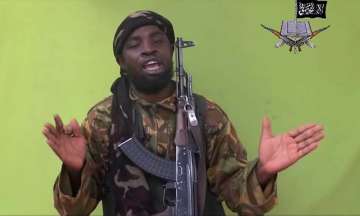Nigeria: Air raid 'fatally wounds' Boko Haram leader Abubakar Shekau, says military
Nigeria's military on Tuesday said that Boko Haram leader Abubakar Shekau is believed to have been fatally wounded in an airstrike while he was praying in a forest stronghold.

Nigeria's military on Tuesday said that Boko Haram leader Abubakar Shekau is believed to have been "fatally wounded" in an airstrike while he was praying in a forest stronghold in northeastern part of the country.
However, there was no way to confirm yet another claim of the death of Nigeria's Islamic extremist leader.
A statement does not say how the military got the information but identifies other commanders as "confirmed dead" in an air raid on Friday.
Nigerian security forces have at least three times in the past declared that they have killed or fatally wounded Shekau, only to have him resurface in video and audio recordings. The military has said in the past that Boko Haram was using look-alike fighters to impersonate the supposedly dead leader.
The strikes came in "the most unprecedented and spectacular air raid" carried out by the Nigerian Air Force while Shekau was praying on Friday, Islam's holy day, at Taye village in the extremists' Sambisa Forest holdout in northeast Nigeria, according to the statement signed by army spokesman Col. Sani Kukasheka Usman.
"Their leader, so-called 'Abubakar Shekau', is believed to be fatally wounded on his shoulders," said the statement.
"Those Boko Haram terrorist commanders confirmed dead include Abubakar Mubi, Malam Nuhu and Malam Hamman, amongst others. While their leader, so-called 'Abubakar Shekau', is believed to be fatally wounded on his shoulders. Several other terrorists were also wounded," he said.
The report comes as U.S. Secretary of State John Kerry is to meet in Abuja, Nigeria's capital, with President Muhammadu Buhari, on a visit to discuss Islamic extremism and regional security. Kerry, speaking Tuesday morning in northern Sokoto city, made no reference to the army's report.
Shekau started the uprising in 2009 that has killed 20,000 people, driven more than 2.2 million from their homes, and spread across Nigeria's borders. It has been marked by deadly attacks and suicide bombings at schools, mosques and marketplaces and mass abductions including nearly 300 schoolgirls taken from a remote school in northeastern Chibok town in April 2014. Dozens escaped but 218 remain missing.
The military believes that the terrorist group is keeping some of the schoolgirls in Sambisa forest.
A video showing dozens of the girls last Sunday said Shekau is willing to negotiate a prisoner swap for detained Boko Haram commanders. President Buhari is under increasing pressure to rescue or negotiate the girls' release, but his spokesman has said officials are wary since previous negotiations failed because officials were duped into talks with the wrong people.
Boko Haram appears to be fractured by a leadership struggle as the Islamic State group announced it had a new leader. Shekau has insisted he is still in charge. He had pledged the group's allegiance to the Islamic State group last year — giving IS its first franchise in sub-Saharan Africa.
Islamic State of Iraq and the Levant (ISIL) group announced in a magazine that Shekau had been replaced by Sheikh Abu Musab al-Barnawi, Boko Haram’s former spokesman.
Boko Haram — which means "Western education is forbidden — resurfaced as a deadly force under Shekau, who took over after a military raid on the group's compound in Maiduguri, the biggest city in the northeast, killed some 700 people and captured leader Mohammed Yusuf was assassinated in police custody.